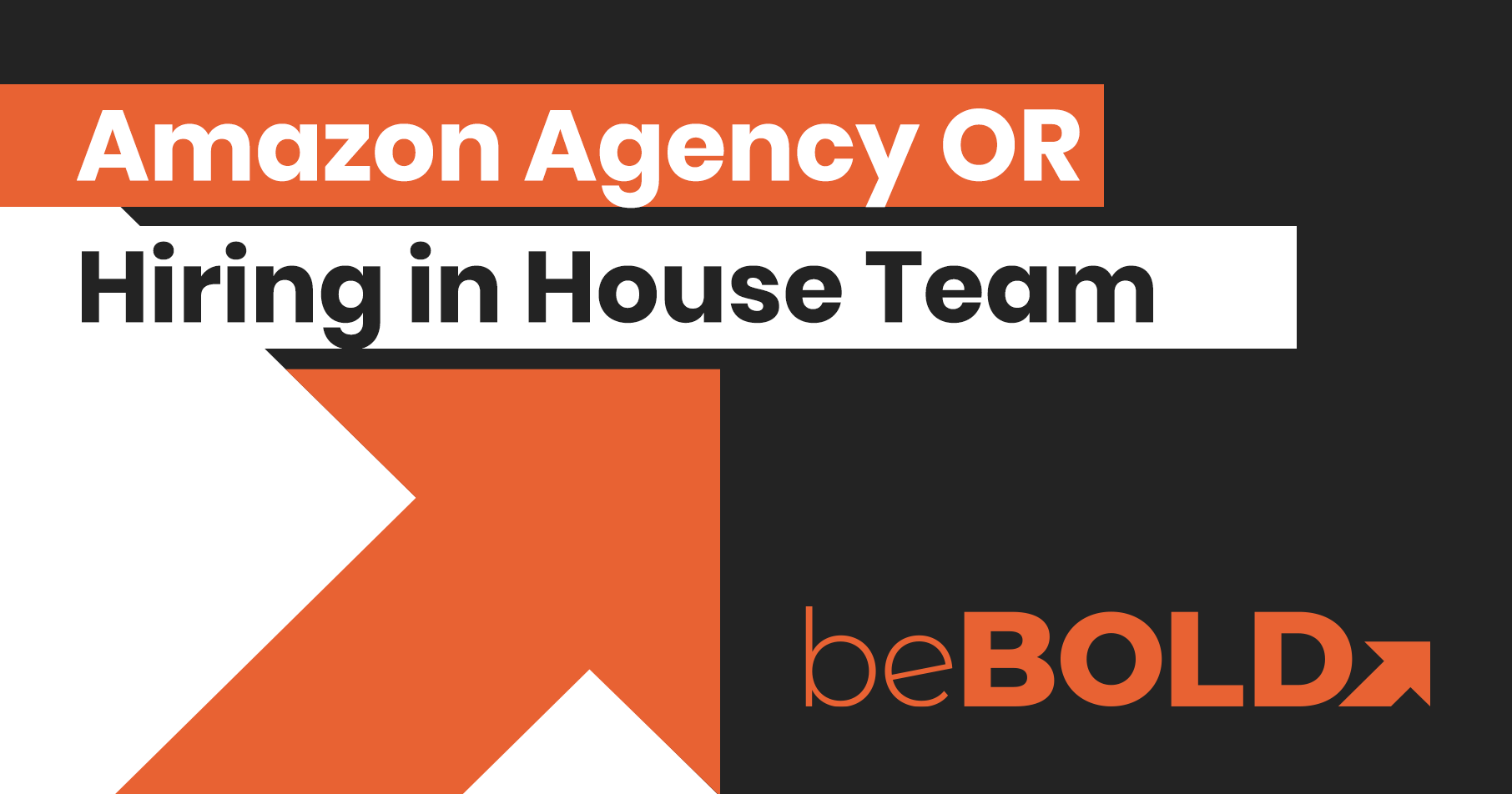Key Summary
- Establishing a solid presence on Amazon is key for brands aiming to succeed in the digital marketplace.
- Becoming an Amazon Seller or Vendor is no easy feat, as businesses quickly learn after listing their first product.
- Two key decisions for businesses: work with an Amazon Agency or build an in-house team of experts? 🤔
- Some businesses prefer the DIY approach, while others opt to invest in experts, weighing the cost vs. time trade-off.
- In-house teams offer direct control, immediate feedback, and close alignment with the company’s culture and goals.
- However, managing an in-house team can be costly, requiring diverse expertise in areas like marketing, data analysis, and Amazon’s algorithms. 💸
- Hiring and training employees for an in-house team can be time-consuming and expensive, with no guarantee of retention.
- An Amazon agency brings specialized knowledge, external perspectives, and efficiency, leveraging their experience across multiple clients.
- Agencies also offer cost efficiency, access to Amazon’s beta programs, and a vested interest in boosting your sales. 📈
- In-house teams are best for businesses valuing control, alignment with company culture, and a deep understanding of their brand identity.
Establishing a robust presence on Amazon has become a strategic move for many brands, especially those aiming to thrive in the digital marketplace.
Becoming an Amazon Seller or Amazon Vendor is not easy – this is something companies learn as soon as they list their first product. Handling everything from building a brand presence to growing revenue is tough to do as a one-man-band.
A critical decision stands before these businesses:
- Working with an Amazon Agency
- Building your in-house team of Amazon experts.
Each option comes with its own set of advantages and challenges, requiring careful consideration.
Some choose the DIY approach while others consider handing off the tasks to experts and spend money rather than investing time. Because of attractive benefits like security and cost-effectiveness, many of them choose to build a team of experts. I think this is a perfectly fine option as long as sellers are aware of the pros and cons of doing so.
Fortunately, through this article, you can decide easily by knowing what to expect between an Amazon advertising agency and an in-house team.
How an In-House Amazon Team Works
Building and managing an in-house team of Amazon experts is another way your business can navigate the e-commerce landscape. In this approach, you can assemble a dedicated team with a deep understanding of your brand and products, tailoring strategies to align with internal goals and values. Since it’s an in-house team, they are more connected to the company’s internal dynamics.
.jpg?width=492&height=369&name=pexels-kindelmedia-7688460%20(1).jpg)
In effect, you can have immediate feedback and direct control over Amazon operations. An in-house team’s responsibility often encompasses a range of tasks, from optimizations to managing advertising campaigns.
But to build a successful in-house team, you’ll need a blend of skills—including proficiency in data analysis, marketing insight, and a keen understanding of Amazon’s ever-changing algorithms. To further help you in your decision, consider the following pros and cons of an in-house Amazon team.
Pros of an In-house Amazon Team
1. Direct control and immediate feedback
An in-house team has in depth knowledge of your own products and business operations, and also allows you to establish immediate feedback loops. You can achieve quicker adjustments and alignment with broader business strategies. This level of control is particularly beneficial for businesses with a specific vision and hands-on approach to their Amazon presence.
2. Company culture alignment
An in-house team naturally aligns with your company's culture, values, and overarching goals. It can translate into a more cohesive strategy, ensuring that your Amazon presence seamlessly integrates with your broader brand identity.
3. Full-time availability
In-house teams are readily available. They offer full-time dedication to the company's Amazon endeavors. With this, you can immediately adapt to market changes, meet customer demands, and implement real-time strategies without delays associated with external agencies.
4. Building an in-house team might be cost-effective
This is the most obvious and the common benefit because of which most of the companies choose to build an in-house team. Mostly everyone has thought that why not hire just one person (an ex-Amazon employee in most cases but these have never been on the outside of Amazon) to handle their Amazon store instead of hiring a team of experienced and professional consultants.
If you are actually hiring just one or two people to handle your Amazon store, then you might save some dollars. But do you really think it is possible for one person to excel in so many areas? And that leads us to our first con.
Cons of an In-house Amazon Team
1. The costs of in-house team are not that less
Unless you hire one individual who is capable of doing everything from on-page optimization and PPC management to case handling, customer service and inventory forecasting, the cost of building an in-house team can break your bank.
Even if you think that hiring 2-3 experts will get the work done, remember you will have to employ a manager to oversee those individuals. And that’s not all. For running a profitable business in a dynamic environment like Amazon, you should have access to top-notch tools and believe me; these tools cost a pretty penny. They aren’t a “one and done” cost either.
2. Tedious hiring and training process
Recruiting, training and skill developing in employees are all necessary activities that take a toll on your time, mental energy and budget. Identifying and hiring individuals with the right skills can be time-consuming and resource-intensive. Additionally, ongoing training is necessary to keep the team updated on the latest Amazon trends and strategies.
A study has shown that the average cost for a business to add a new employee is $4,129 and that is just the cost of bringing them to your door. And after all this hassle, there is no guarantee that they will stay with you forever. Even if one of your skilled in-house Amazon team members leaves, you will have to start all over again.
Additional costs include healthcare, benefits, cost to hire and fire an employee.
By comparing these costs with the cost of hiring an agency, you will get a clearer idea of which option is better in terms of a financial standpoint.
3. Limited external perspectives
An in-house team may operate within a bubble, limiting exposure to external perspectives and industry insights. This limitation can result in a narrow view, missing out on innovative strategies and opportunities that an external agency might bring to the table.
4. No networking or relationship with Amazon
No matter how huge you are, you will need Amazon’s help at some (or rather many) points of time. So it goes without saying that having a “close relation” with Amazon will provide you an unfair advantage over the others.
A good agency will know how to deal with Amazon and how to get the work done. What might take days for you to complete, they might get it done within just a few hours. Because of the time they have spent working in the Amazon industry, they have a large network and valuable contact bank to take care of everything.
Moreover, an ex-Amazon employee doesn’t mean they have the knowledge on the outside of Amazon to make your Amazon business successful
Does your current agency or internal staff know how to answer this question - What is provision for receivables?
5. Workload management challenges
Managing the workload of an in-house team can be logistically challenging, especially during peak periods or sudden market shifts. The ebb and flow of Amazon's marketplace demand may require scalability that an in-house team may struggle to provide without experiencing burnout or operational inefficiencies.
6. Other disadvantages of an in-house Amazon team:
- Who handles the Amazon account (sales or marketing or IT)? There needs to be a combined knowledge of all of all 3 of these.
- Lack of experience and skills, especially Amazon Advertising experts
- Keeping up with Amazon policy changes and new programs within Amazon
How an Amazon Agency Works
An Amazon agency partnership is a strategic move that can propel your business in an age of eCommerce prominence. They are your dedicated partner, specializing in navigating the complexities of Amazon marketplace management. This collaboration hinges on the synergy between your business and the agency, with a shared goal of maximizing sales and platform visibility.
Moreover, these agencies typically offer a range of services—from Amazon SEO to PPC services. They also provide a nuanced understanding of the platform’s algorithms, keyword strategies, and market trends. With the agency’s expertise and specialization in Amazon’s ever-evolving landscape, your business can gain a competitive edge.
Pros of an Amazon Agency
Here are a few more considerations for hiring an Amazon agency.
1. They are far ahead in experience and skills
Your in-house team works only in your seller or vendor account and that is why their knowledge is obviously going to limited. A plethora of clients helps an Amazon agency experience the many aspects of selling on Amazon that comes with managing different accounts on several platforms (seller and vendor) and marketplaces.
It’s rare for an agency to encounter a problem they have never seen before because the cross-pollinated experience of working with various clients gives them the ability to tackle anything and everything. Any problem you are dealing with now is already faced and solved by the agencies somewhere else. They also adapt to changes quickly and a good team can even forecast Amazon’s move and prepare your Amazon store for that.
You should also read: What Is an Amazon Agency? Benefits, Questions to Ask Them, FAQs
Amazon agencies can also tap into a reservoir of expertise, including relationships with Amazon within various teams (Luxury Beauty, Professional Beauty, Marketing, etc.).
They're dedicated specialists with a laser focus on Amazon’s ecosystem. From staying on top of algorithm updates to understanding the intricacies of product listing optimization, their specialized knowledge can significantly enhance your Amazon marketing strategies.
2. External perspective and industry insights
Amazon agencies bring an external perspective to the table. They offer invaluable industry insights and a broader view developed from working with diverse businesses, enabling them to adapt strategies effectively. This external viewpoint can uncover untapped opportunities and innovative approaches that may not be apparent from an in-house vantage point.
3. Cost efficiency
In discussions about choosing between an Amazon marketing agency vs. an in-house team, opting for the first option proves to be a cost-efficient solution for many businesses. Instead of bearing the overhead costs associated with maintaining an in-house team, you can leverage the services of an agency in a more flexible and scalable way.
This advantage can be particularly advantageous if you’re a small enterprise seeking top-quality Amazon experts without the hefty investment.
4. Other advantages of an Amazon agency:
- Has a team of Amazon Advertising specialists
- Access to Beta Programs available at Amazon
- Understanding and Certification within the Amazon Advertising Platform (Sponsored Products, Sponsored Brands, DSP, Video Ads)
- Understanding and Certification in Amazon Attribution
- Experience across multiple long term clients allows best practices to be shared with your company.
- Vested interest to grow sales because both sides benefit (revenue sharing)
Cons of an Amazon Agency
1. Limited control
While collaborating with an Amazon agency brings expertise, it may come at the cost of some control. You may find yourself handing over certain aspects of decision-making to the agency. This concern could lead to a perceived lack of control over your Amazon operations.
2. Communication challenges
Effective communication is essential in any collaboration—and working with an external agency can introduce a layer of difficulty. Misalignments in strategy or misunderstanding of business goals can occur, leading to challenges in communication that may impact the overall effectiveness of the partnership.
3. Lack of immediate business knowledge
Indeed, an Amazon agency is well-versed in navigating the complexities of the platform. However, they may lack immediate knowledge about the internal workings and unique nuances of your business. This gap can sometimes result in strategies that may not align with your brand’s broader objectives.
4. Losing the sense of involvement
Agencies are external and generally prefer to keep their knowledge and expertise to themselves, so the company is not able to develop a skill set they require to survive and thrive on Amazon. Good agencies should be educating their clients (companies) on what is going on with their Amazon account.
If the company decides to leave the agency, then all the knowledge of building and increasing Amazon sales is also lost. While building your own in-house team will help you to retain the experience with you if that in-house team actually has the knowledge from the beginning.
5. Other disadvantages of an Amazon agency:
- Expensive upfront doesn’t always mean good - look at doing a revenue sharing contract where both parties benefit
- In depth knowledge about all of your products (good agencies learn about your products)
- In depth knowledge of business operations (good agencies learn about your business and become an extension of your business)
Amazon Agency vs. In-House Amazon Experts: Which is Best?
Putting things all together, consider the table below to help you choose between an Amazon advertising agency vs. an in-house team.
|
An Amazon agency is best if... |
An in-house Amazon team is best if... |
|
|
Elevating Your Amazon Presence
Choosing between an Amazon marketing agency vs. an in-house team requires a nuanced understanding of the trade-offs. An agency offers specialized prowess and external insights. Meanwhile, an in-house team provides direct control and cultural alignment. That said, you must first weigh your needs, priorities, and long-term goals when deciding.
If you are selling a product or two, then building a small in-house team is feasible, but if you are running a large retail operation on Amazon, then hiring an expert team is the best solution for you. However, regardless of who you choose, it is essential to build a strong and long-lasting relationship and have complete transparency with them.
Remember, striking the right balance between external expertise and internal control is the key to surviving and thriving in the fast-paced world of eCommerce.
Ready to enhance your Amazon marketing efforts? Looking for an Amazon account management agency near you? Partner with beBOLD Digital - we have a wide range of services to help you navigate the marketplace seamlessly. Don't hesitate to reach out and contact us today!










Comments